Key takeaways:
- Preparation and understanding the audition environment are crucial for building confidence and performance quality.
- Key skills to showcase include authenticity, adaptability, and strong communication, all of which enhance the overall audition experience.
- Building resilience and learning from feedback transform challenges into growth opportunities, fostering continual improvement in one’s craft.
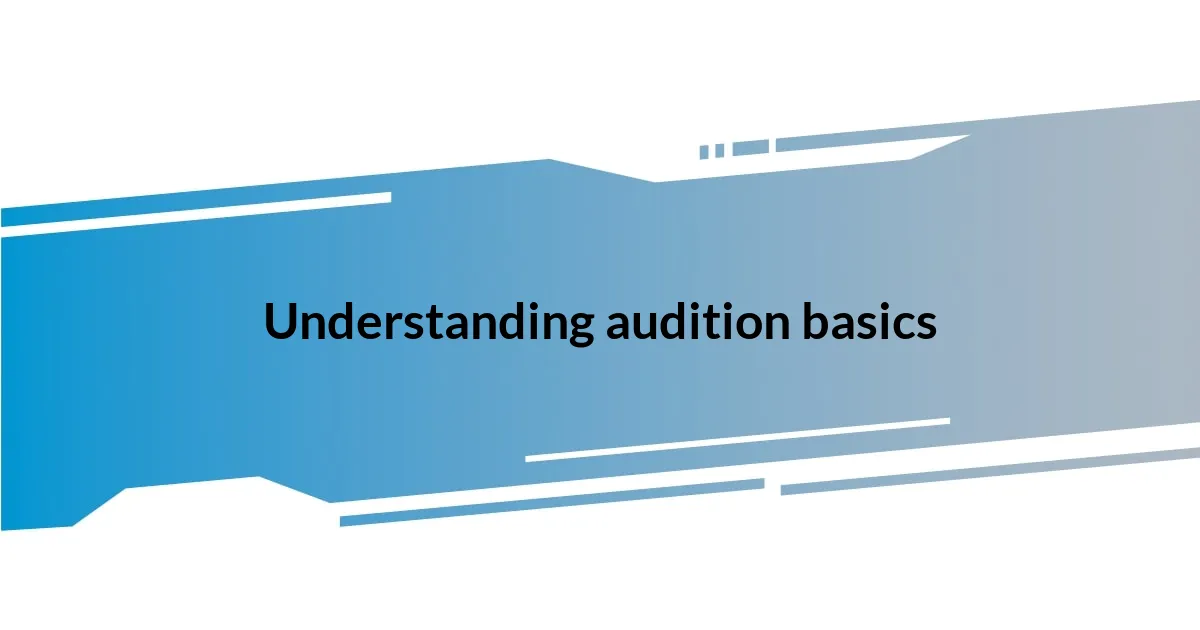
Understanding audition basics
Understanding audition basics is crucial for anyone stepping into this often intimidating process. I remember my first audition vividly; my nerves were racing, and I found myself questioning whether I even belonged there. Isn’t it interesting how a moment can feel so monumental yet so ordinary at the same time?
One fundamental aspect of any audition is preparation. I learned early on that knowing your material inside and out can significantly boost your confidence. Have you ever felt that thrill when you nail a line perfectly? It’s that thrill that reminds you why you fell in love with performing in the first place.
Additionally, understanding the space you’re auditioning in can make a world of difference. When I walked into a large audition room for the first time, the echo of my voice startled me. It made me realize just how important it is to adapt and connect with the setting. Have you thought about how your environment affects your performance? It’s something I now keep in mind every time I prepare for an audition.
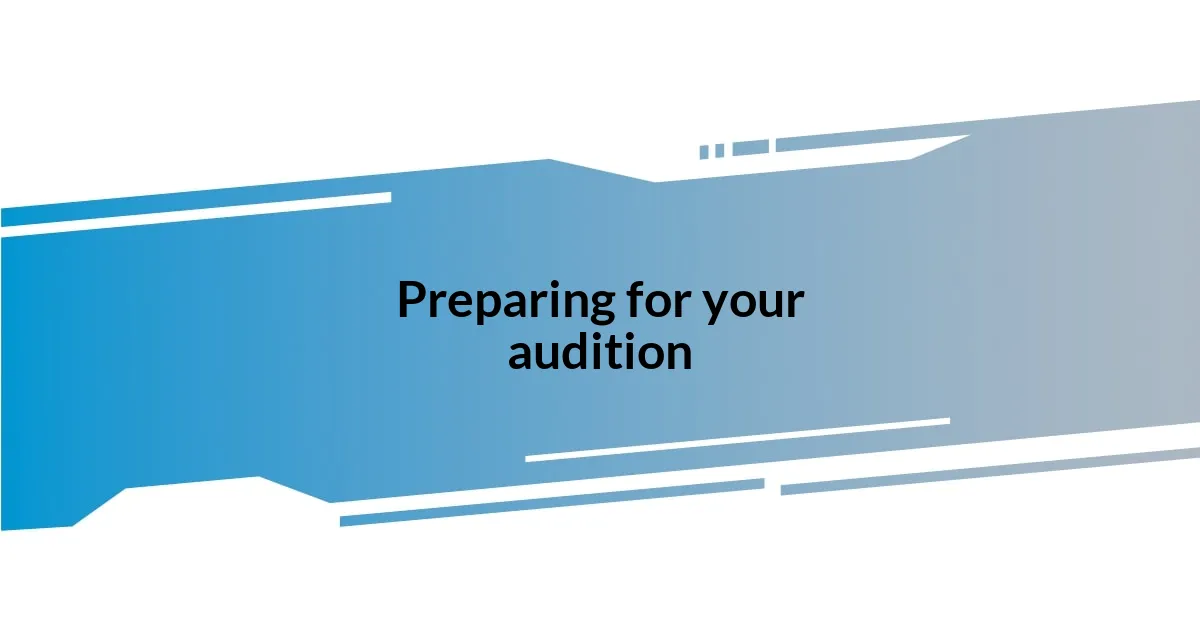
Preparing for your audition
When preparing for your audition, I’ve found that creating a structured plan can ease some of that pre-performance anxiety. A few days before my first major audition, I mapped out a schedule that included practice sessions, vocal warm-ups, and even some time for relaxation. This multitiered approach helped me maintain focus without feeling overwhelmed. You might be surprised by how grounding a little organization can be.
Here are some practical tips I recommend to enhance your preparation:
- Choose the right material: Pick pieces that resonate with you personally; that connection can elevate your performance.
- Practice in front of others: Performing for friends or family can simulate the audition environment and build your confidence.
- Study the role: Research the character deeply; understanding their motivations can enrich your portrayal.
- Warm up your body and voice: Simple exercises can open up your vocal cords and release tension in your body, encouraging a more authentic presentation.
- Visualize success: Picture yourself delivering a stellar performance; positivity can shift your mindset significantly.
- Prepare for the unexpected: Have a backup plan in case things don’t go according to schedule, whether it’s an alternate piece or adjusting to last-minute changes in the audition format.
Remember, preparation isn’t just about skill; it’s also about embracing the experience. I learned that balancing diligent practice with a genuine sense of curiosity and enjoyment truly sets the stage for a memorable audition.
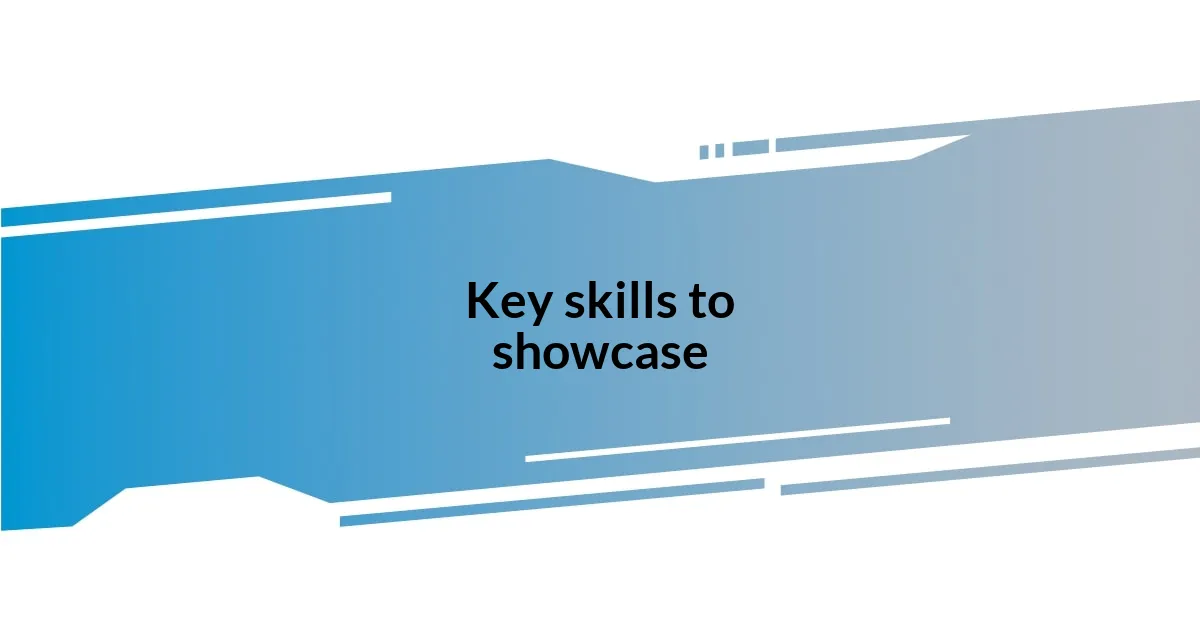
Key skills to showcase
When it comes to showcasing key skills during an audition, I’ve found that authenticity and emotional connection are paramount. The first time I stepped onto a stage, I realized that simply memorizing lines wasn’t enough; I needed to breathe life into them. Have you ever watched someone perform and felt an inexplicable connection? That’s what I strive for – to let my true self shine through.
Another vital skill is adaptability. Auditions can be unpredictable, and I’ve learned that being flexible in the moment can turn a potentially awkward situation into a standout performance. For instance, I recall an audition where the director unexpectedly asked me to improvise a scene. My heart raced, but embracing the challenge not only showcased my versatility but also made the experience exhilarating. Have you considered how your ability to pivot could influence your audition outcomes?
Lastly, strong communication skills are crucial in auditions, as they extend beyond delivering lines. I once stood in an audition room where a simple nod from the casting director encouraged me to delve deeper into the character’s emotions. It was a revelation; I understood that responding to the energy in the room can make a significant difference. Can you think of moments when engaging with your audience transformed your performance?
| Key Skill | Description |
|---|---|
| Authenticity | Bringing genuine emotions and personal connection to your character. |
| Adaptability | Adjusting quickly to unexpected changes, showing versatility in performance. |
| Communication | Engaging with the audition panel and responding to their cues effectively. |
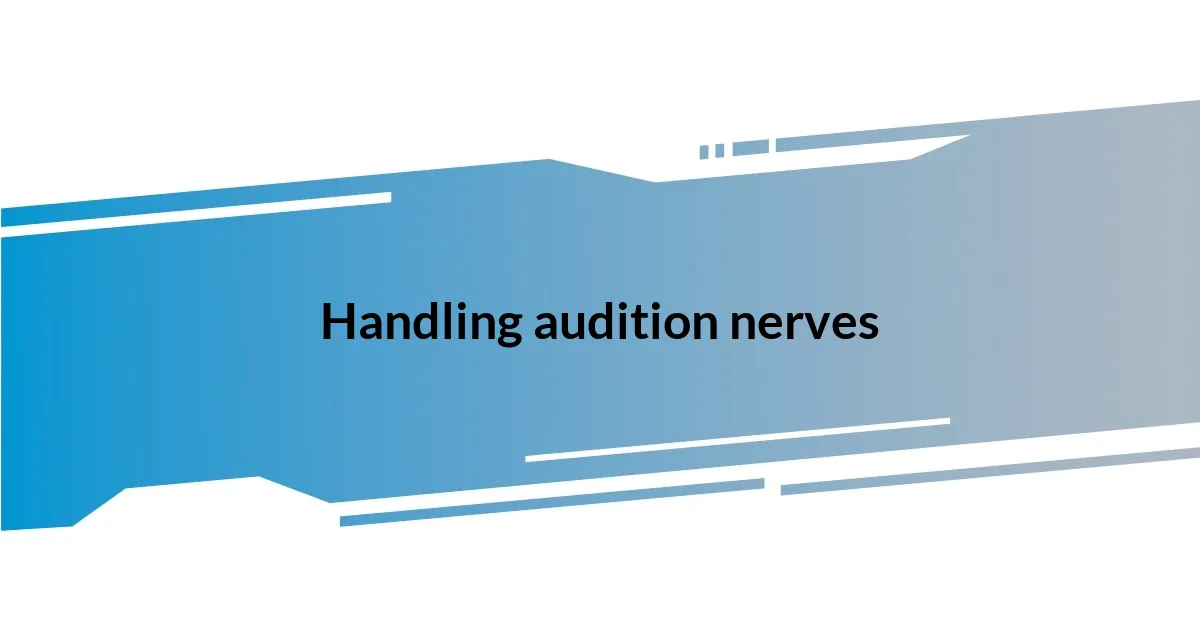
Handling audition nerves
Handling audition nerves is something I’ve grappled with more times than I can count. One particularly nerve-wracking audition had me pacing outside the door, my heart racing like I had just run a marathon. In that moment, I took a deep breath and remembered an important lesson: embracing those nerves can actually fuel your performance. Have you ever found that a little adrenaline can sharpen your focus?
An effective strategy I discovered is to ground myself in the moment. I started using simple breathing techniques—three deep breaths in and out. Not only did it calm my mind, but it also brought me back to the reasons I love performing. I fondly recall stopping to close my eyes and visualizing the audience not as critics, but as friends excited to see me shine. This simple shift in perspective really transformed my energy. Have you tried reframing how you perceive your audience?
Finally, I learned the value of sharing my feelings about nerves with fellow auditioners. One time, after exchanging our fears in a group, I realized we all experience similar feelings—even the seasoned performers. Talking about it was a revelation; it made me feel a sense of camaraderie. Have you ever thought that your vulnerabilities might actually connect you with others, rather than isolate you? Opening up can create a supportive atmosphere that not only helps ease your nerves but also fosters a sense of community among performers.
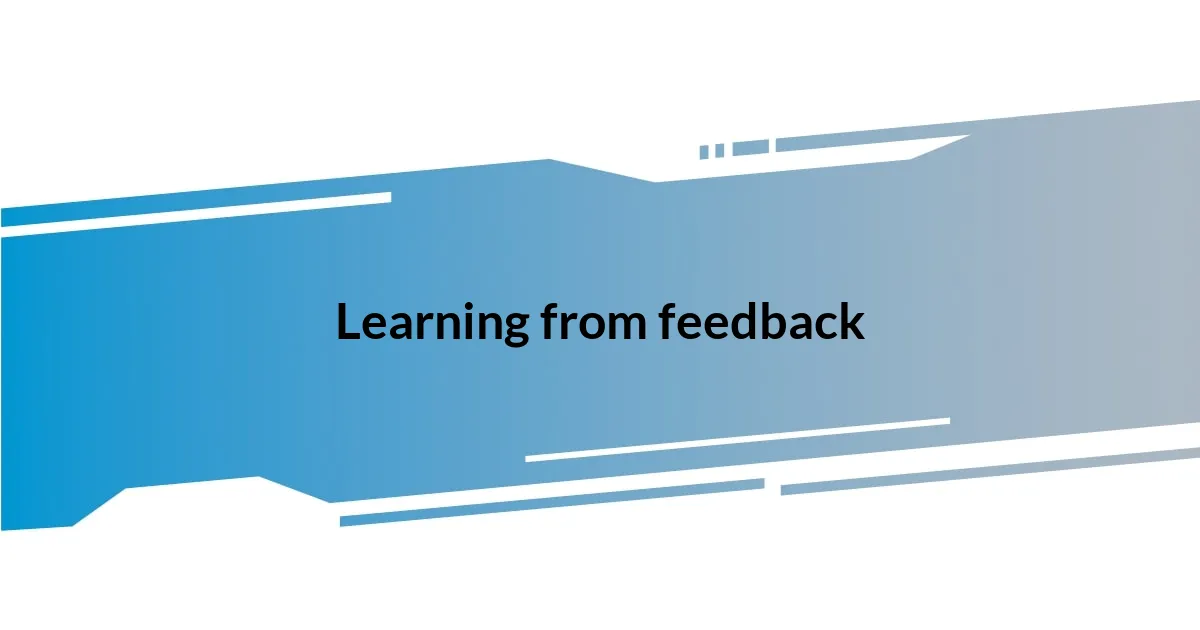
Learning from feedback
I remember the first time I received feedback after an audition. The casting director mentioned my energy was great, but I was a bit too “on-the-nose” with my emotions. At first, it stung a little, but then it got me thinking—how can I embrace this critique? I realized that constructive feedback is a gift, providing insight into how I can grow as a performer.
After the initial shock of criticism wore off, I dove deeper into understanding what the feedback meant. I started recording myself during rehearsals and auditions, scrutinizing the moments where I could enhance my emotional range. Seeing myself from a different perspective taught me invaluable lessons. Have you ever caught something in your own performance that you wished you could change? It’s enlightening, isn’t it?
Feedback sessions with peers can also be eye-opening. I once attended a workshop where we all shared specific notes after performing. Hearing how others perceived my choices gave me a new lens through which to view my work. It brought forth a wave of realization—our interpretations can vary widely. What surprised me most was how an outsider’s perspective could illuminate aspects I hadn’t even considered. Have you sought feedback from friends or colleagues? It’s amazing how collaboration can expand our horizons and enhance our craft.
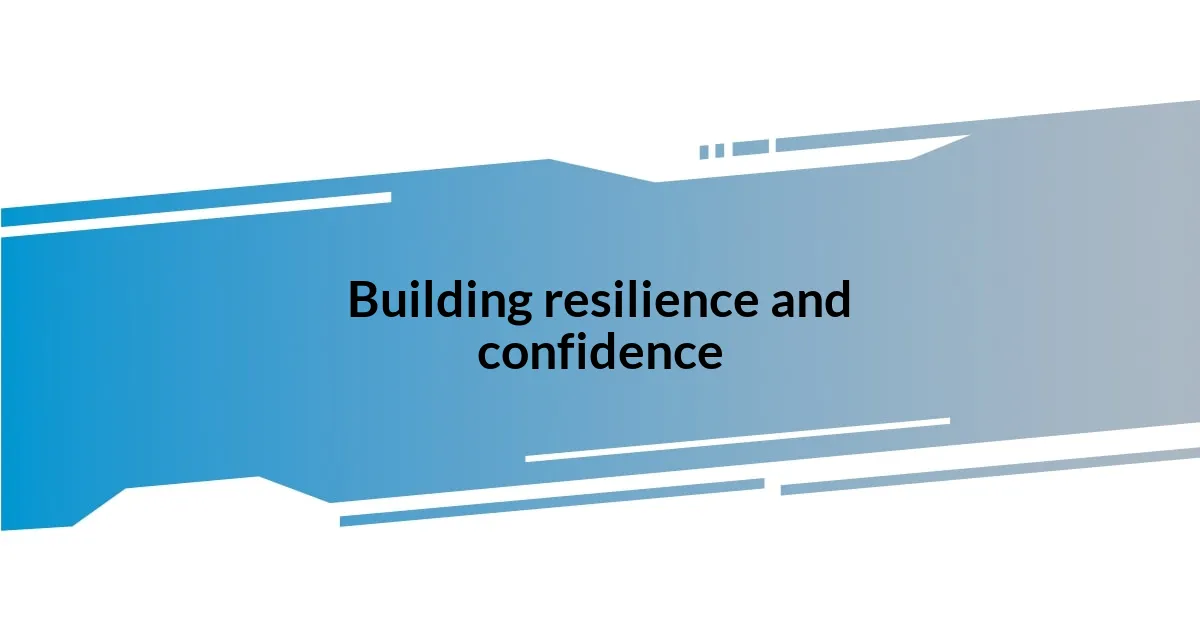
Building resilience and confidence
Building resilience and confidence is something that became clearer to me as I navigated through countless auditions. I still remember a time when I faced a particularly tough panel that left me doubting my abilities. In that moment of vulnerability, I learned that each audition is not just a test but an opportunity to bounce back. Have you ever felt the weight of self-doubt? It’s a heavy burden, but pushing through those moments can ultimately fortify our resolve.
One striking experience was when I bombed an audition spectacularly. I left the room feeling defeated and questioning my talent. Instead of wallowing in that disappointment, I decided to use it as fuel for my next performance. I forced myself to prepare even harder, channeling that pain into something productive. Did you know that resilience often stems from turning adversity into motivation? It’s incredible how a setback can transform into a stepping stone if you allow it to.
Building confidence isn’t a one-time effort but a constant journey shaped by every audition experience. During another casting call, I caught myself smiling too much in a serious scene, feeling like I was losing a part of my authenticity. Afterward, I took time to reflect—not just on what went wrong, but also on the traits that make me unique. Embracing my quirks and individuality helped me realize that confidence comes from being comfortable in my own skin. Have you ever tried to embrace what sets you apart? Trusting yourself is a powerful foundation for building that inner strength.
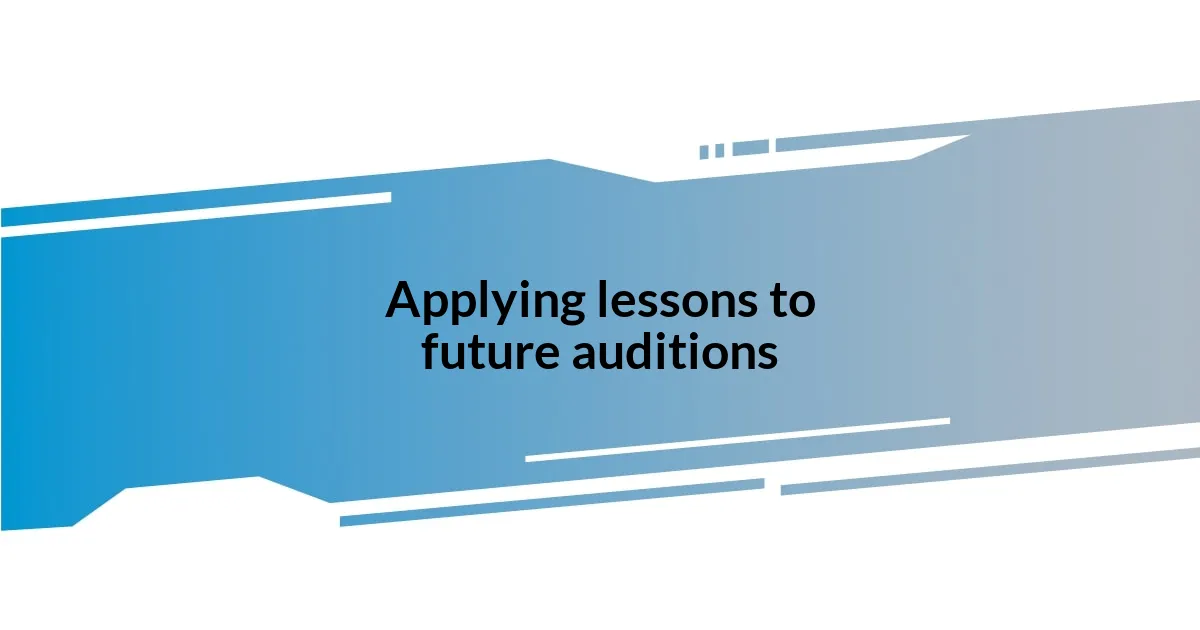
Applying lessons to future auditions
Building on the lessons from past auditions is crucial for growth. I recall after an audition where my performance fell flat, I felt deflated. Instead of dwelling on it, I used that experience as a springboard, diving into new techniques to elevate my craft. Have you ever felt that moment of failure turn into a catalyst for improvement? It can be liberating to channel those disappointments into learning opportunities.
One method that has worked wonders for me is setting specific goals for each audition. For instance, after receiving feedback about my pacing, I committed to practicing with a metronome, helping me find a rhythm that felt natural yet engaging. I remember nailing my next audition, feeling in control and vibrant, which was a direct result of the effort I put into mastering that skill. When you define what you want to improve, the pathway to success becomes clearer.
Harnessing past experiences can also reshape your mindset before each audition. I’ve learned to visualize myself excelling in each role rather than fixating on the fear of failure. Before stepping into the audition room, I often take a moment to remind myself of previous triumphs—whether it was a scene that went exceptionally well or an unexpected compliment from a casting director. This practice transforms anxious energy into excitement. Have you found techniques to boost your confidence before facing a panel? It’s incredible how a slight shift in perception can ignite a fire within.
